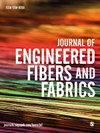舒适型双纱起绒织物的紫外线防护系数评价
IF 2.3
4区 工程技术
Q1 MATERIALS SCIENCE, TEXTILES
引用次数: 5
摘要
针织起绒面料具有优越的舒适性特点,主要集中在冬季穿着。热特性是选择起绒服装时感兴趣的一个方面。然而,环境危害也需要关注。在紫外线照射较多的寒冷地区穿羊毛衣服。因此,服装应该具有对抗环境挑战的能力。研究了不同材料的工程变绒结构。棉、尼龙和聚丙烯摇绒图案已经用摇绒1:1、3:1和2:2的图案编织。在起绒过程中,不同的褶子和漏针的设计不同。舒适性通过透气性、湿度管理和热阻测试来确定。从抗起球性能和紫外线防护系数(UPF)两方面对性能指标进行了评价。具有较好的舒适性和满意的UPF的结构和材料被预测为紫外线影响区域的安全服装,即摇绒3:1同时具有最佳的舒适性和UPF;而2:1和1:1起绒织物的机械性能较好,因为漏针浮纱量较少。本文章由计算机程序翻译,如有差异,请以英文原文为准。
Ultraviolet protection factor evaluation of comfort oriented two-yarn fleece fabrics
Knitted fleece fabrics with superior comfort characteristics are chiefly focused in winter wear. Thermal characteristics are an area of interest in selecting fleece clothing. However, environmental hazards also need to be focused. Fleece clothing is worn in cold areas having higher ultraviolet rays exposures. Hence the clothing should have the capability of combating environmental challenges. The study focuses on engineering variable fleece structures with different materials. Cotton, nylon, and polypropylene fleece patterns have been knitted using fleece 1:1, 3:1, and 2:2 patterns. The designs vary by tuck and miss stitch configurations in the fleece course. Comfort characteristics were determined through air permeability, moisture management, and thermal resistance tests. Performance criteria were evaluated in terms of pilling resistance and ultraviolet protection factor (UPF) investigation. Structures and materials owing better comfort characteristics with satisfactory UPF have been predicted as safe clothing in UV affected zones, that is, fleece 3:1 possessed the optimum comfort characteristics and UPF simultaneously; however, the mechanical performance was better for 2:1 and 1:1 fleece fabric due to less amount of miss stitch floating yarns.
求助全文
通过发布文献求助,成功后即可免费获取论文全文。
去求助
来源期刊

Journal of Engineered Fibers and Fabrics
工程技术-材料科学:纺织
CiteScore
5.00
自引率
6.90%
发文量
41
审稿时长
4 months
期刊介绍:
Journal of Engineered Fibers and Fabrics is a peer-reviewed, open access journal which aims to facilitate the rapid and wide dissemination of research in the engineering of textiles, clothing and fiber based structures.
 求助内容:
求助内容: 应助结果提醒方式:
应助结果提醒方式:


